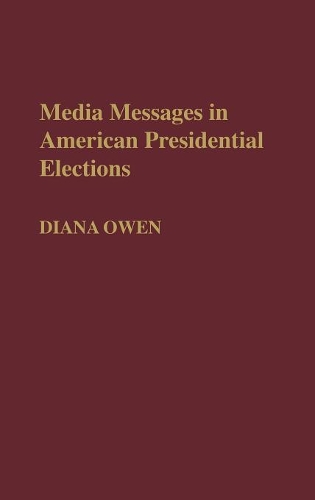
Media Messages in American Presidential Elections
(Hardback)
Publishing Details
Media Messages in American Presidential Elections
By (Author) Diana Owen
Bloomsbury Publishing PLC
Praeger Publishers Inc
18th January 1991
United States
Classifications
Tertiary Education
Non Fiction
Media studies
324.730973
Physical Properties
Hardback
224
Description
Focusing her attention on the audience, Diana Owen investigates the way people process media messages during campaigns. This study examines the role of ads, news stories, poll results, and debates in Presidential elections. Based on surveys fielded during the 1984 and 1988 Presidential campaigns, Owen compares these four message categories to determine their relative importance to voters. In addition she investigates how individuals make use of messages in establishing their perception of candidates and issues. The uses and gratifications of mass communications provides the theoretical foundation for this book. It is designed for researchers and students in communications and mass media, voting behaviour and public opinion.
Reviews
"Owen explores the mass media's influence on voters' perceptions in presidential elections. Most such studies examine a single type of political message, such as candidates' televised political advertising. Owen's refreshing contribution compares the relative importance of four principal campaign messages--TV ads, news accounts, published poll results, and candidate debates. Her model emphasizes that how individuals use and process media information derives from motives for use and exposure to media. Her analysis draws on data generated through country-level opinion surveys in the 1984 and 1988 presidential elections. Separate chapters examine audience responses to ads, news, polls, and debates; the final two chapters draw message comparisons. A series of multiple-regression tables support conclusions 'that individuals make distinctions among types of media messages in elections on the basis of their orientations toward the mass media and the political realm;' different categories of messages serve different voters' needs; and patterns of voters' media use predict received gratifications. The bibliography is an up-to-date listing of more than 350 key studies."-Choice
Owen explores the mass media's influence on voters' perceptions in presidential elections. Most such studies examine a single type of political message, such as candidates' televised political advertising. Owen's refreshing contribution compares the relative importance of four principal campaign messages--TV ads, news accounts, published poll results, and candidate debates. Her model emphasizes that how individuals use and process media information derives from motives for use and exposure to media. Her analysis draws on data generated through country-level opinion surveys in the 1984 and 1988 presidential elections. Separate chapters examine audience responses to ads, news, polls, and debates; the final two chapters draw message comparisons. A series of multiple-regression tables support conclusions 'that individuals make distinctions among types of media messages in elections on the basis of their orientations toward the mass media and the political realm;' different categories of messages serve different voters' needs; and patterns of voters' media use predict received gratifications. The bibliography is an up-to-date listing of more than 350 key studies.-Choice
well grounded in the literature on media and elections and should be of interest to students of American presidential politics, political communications, or media influence.-AMERICAN POLITICS
"well grounded in the literature on media and elections and should be of interest to students of American presidential politics, political communications, or media influence."-AMERICAN POLITICS
Author Bio
DIANA OWEN is an Assistant Professor of Political Science at Rutgers University. Her articles have been published in Political Psychology, Women and Politics, Transaction/Society. Another article by her is forthcoming in Communication Research.
